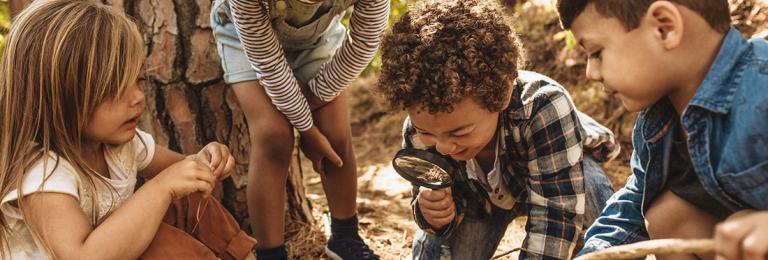Curiosity, exploration, repetition and confidence
When engaging in play, children go through a process of curiosity, exploration, and repetition. This process plays a vital role in building confidence in physical activity and play.
Curiosity serves as a powerful motivator for children, driving them to engage with items and objects during play. Their innate curiosity about the world around them compels them to explore and interact with their environment. Whether it's the allure of novel objects, intriguing sounds, vibrant colours, or fascinating shapes, their natural curiosity piques their interest. When children encounter something that sparks their curiosity, they want to investigate further, manipulating, touching, and examining it. Through this exploration, they gather information, discover properties, and gain a deeper understanding of how things work and can be used.
This process of curiosity-driven exploration fosters cognitive, sensory, and motor development. By encouraging and supporting their curiosity, parents and caregivers can help instill a lifelong love for learning and exploration.
Repetition in physical activity is another essential component in building confidence. As children engage in physical activities repeatedly, they become more familiar with the movements, skills, and techniques involved. With consistent practice, they develop muscle memory and enhance their coordination, balance, and overall physical abilities. Through repetition, children progress from initial uncertainty to a sense of mastery. They become more proficient in executing movements, achieving goals, and overcoming challenges. This progression builds their confidence in their physical capabilities, reinforcing their belief in their ability to successfully perform tasks.
Repetition also allows children to refine their skills based on previous experiences. By repeating physical activities, they can learn from their mistakes, identify areas for improvement, and implement strategies to enhance their performance. This iterative process helps children develop physical literacy.
Additionally, repetition offers predictability and familiarity, reducing anxiety and increasing comfort levels. As children become more accustomed to a particular physical activity through repetition, they feel at ease and confident in their ability to engage in it. This confidence empowers them to take on new challenges, push their limits, and explore more complex movements or activities.
However, it's crucial to strike a balance between repetition and exploration. While repetition builds confidence, introducing new challenges and experiences is also vital for growth and development. By providing opportunities for variety and exploring new activities, children can broaden their skill set while continuing to build a solid foundation of confidence in their physical abilities.
The combination of curiosity, exploration, and repetition in physical activity and play contributes to the development of confidence in children. Curiosity motivates them to explore their environment and engage with objects, fostering a love for learning and discovery. Through repetition, children gain mastery over physical skills, refining their abilities and building confidence in their capabilities. By encouraging both repetition and exploration, parents and caregivers can support children in developing a strong sense of confidence and enjoyment in physical activities.
